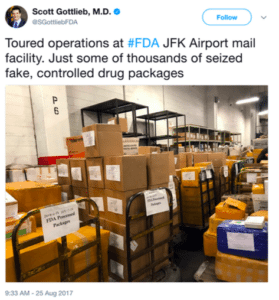U.S. Postal Inspectors Are On The Front Line In the Fight To Keep Fentanyl Out Of The Country
 According to the Washington Post, U.S. Postal Inspectors are increasingly finding themselves on the front line in the fight to keep fentanyl out of the country. When South Dakota resident Trevor Harden ordered thousands of fentanyl pills off the internet, a package containing part of his shipment caught the eye of postal inspectors in Rapid City, South Dakota. Authorities were alerted and were waiting when Harden picked up his package.
According to the Washington Post, U.S. Postal Inspectors are increasingly finding themselves on the front line in the fight to keep fentanyl out of the country. When South Dakota resident Trevor Harden ordered thousands of fentanyl pills off the internet, a package containing part of his shipment caught the eye of postal inspectors in Rapid City, South Dakota. Authorities were alerted and were waiting when Harden picked up his package.
U.S. Drug Enforcement Administration (DEA) spokesman Melvin Patterson showed the simplicity of obtaining illicit drugs online when he said: “Via the Internet you order fentanyl, then it’s mailed over.” The purchasing of fentanyl online has become such an issue that the President’s Commission on Combating Drug Addiction and the Opioid Crisis suggested requiring electronic data on all packages and using of additional technologies and drug detection dogs to intercept fentanyl at International Mail Facilities.
Users only need a tiny amount of fentanyl to get high which means the envelopes or packages used to ship the drug in are also small, increasing the likelihood that they will get through. The head of the New York Division of the DEA James Hunt said “What’s coming through the mail is for small traffickers and users on the dark Web. The cartels don’t have to send fentanyl through the mail.” The DEA previously stated that they believe that most illicit fentanyl and fentanyl precursors come from China.
For its part, the U.S. Department of Justice (DOJ) is moving against online dealers. In July, they took down AlphaBay, a dark Web illicit market for drugs, firearms, and fake documents. Authorities reported that the website had more than 250,000 listings for illegal drugs on it. In October, the DOJ announced charges against two Chinese nationals who were part of a fentanyl drug trafficking right.
According to a report on Channel News Asia, the U.S. asked the Chinese government to crackdown on shipments of illicit opioids being sent from their country via the postal service. James Walsh of the State Department’s Bureau of International Narcotics and Law Enforcement Affairs met with Chinese counter-narcotics officials in Cancun, Mexico, at a global conference on drug addiction earlier in December. He found his Chinese counterparts receptive to working to curb shipments of opioids produced in Chinese labs. “We’ve been asking China to get better control on their production, better assistance with monitoring their mail that’s being shipped either to Mexico or the United States. We’ve had very good conversations.”